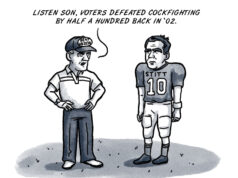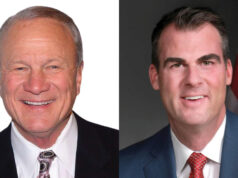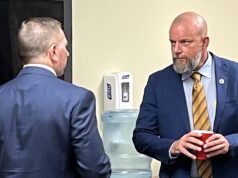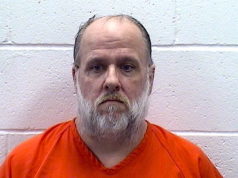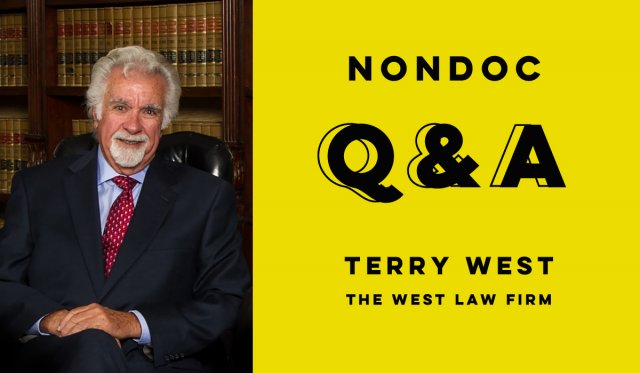

Terry West is a well-known and respected Oklahoma trial lawyer. As a teenager, he graduated at the top of his 12-student class in Francis, just northeast of Ada in Pontotoc County. He attended East Central University and the University of Oklahoma before earning his juris doctorate from the University of Tulsa College of Law. West started his career in the newspaper business, but he wound up building The West Law Firm in Shawnee as one of the most successful law practices in the state.
Most recently, he has spearheaded support for a civil legal aid service at the University of Tulsa that was subsequently named after him. The following Q&A with West discusses that project, his career and his friendship with famed OU football coach Barry Switzer. The following responses have been edited lightly for style and grammar.
Tell us how you got to where you are now. Where did you grow up, and what led to your legal career?
I grew up in the tiny town of Francis where my class of 12 was the largest in school for all 12 years we attended there. They closed the school one year after we graduated. I then attended East Central University and OU, majoring in journalism. While in the newspaper and public relations business as a youngster (I was the editor of the Ada Weekly News at 21), I felt a compulsion to be the boss, to be responsible for my own success or failure. I knew that was less likely to happen if I always worked for someone else. That exercise in circumspection led me to law school. Since my new wife was now pregnant, I was required to work and attend night school at TU. That was not easy and remains my most satisfying accomplishment.
You have a long history of defending people who have been wronged by powerful institutions, from injuries by defective products to Guantanamo detainees. Where does your sense of justice and the motivation to defend the underdog in our society come from?
It was apparently my nature to represent the underdog. I enjoyed fighting huge corporations for those who had been wronged by them. I remember once having a case against Goodyear tire and thinking they not only have hundreds of lawyers fighting us, but they have a blimp! That can’t be a fair fight, but it is very satisfying when justice prevails.
I was drawn to the Guantanamo detainees when a retired federal judge asked me to help him and others try to get some form of justice for those being wrongfully held. It has always struck me as absurd that we seem to think, as individuals and as a country, that if we are mad enough we can ignore the rules. The U.S. Constitution does not say that. It guarantees us due process regardless of the offense. What we hoped to do for the detainees was not to get them released, but just to make the government follow the rules. Because the government was so angry at their actions, they did not even charge them with a crime. They just locked them up. It was not a popular cause, and newspapers editorialized against us, but the fight went on for years. Despite the efforts of a lot of thoughtful lawyers, there are still a few locked up there today.
Most recently, you used your connections at the Sarkeys Foundation and the University Of Tulsa College of Law to kick-start a program to help those in need of legal representation in civil cases who are unable to afford it. We all know that lawyers can be expensive, but what is wrong with a person not being able to afford legal advice?
Our judicial system has long provided lawyers for those charged with crimes who do not have the ability to hire an attorney, for obvious reasons. A common misconception by lay people is that lawyers, provided or hired, are there to get the defendant “off.” That is not so. We are there to be certain everyone gets a fair trial and, if they are guilty, they should be lawfully punished. In contrast to that, there has never been a good system to provide counsel to those under-privileged folks who may be victims of unscrupulous people who would take advantage of their inability to fight back.
The consequences from a society not having enough health care or educational resources are more obvious and tangible than the consequences of a shortage of legal services. Could you help us visualize what those problems are and what it does to Oklahoma families?
There are many areas where assistance can be needed, such as probate of even lesser estates, immigration, landlord-tenant issues, estate planning, education issues and most often just legal advice on everyday problems. It may not seem as important as health care, but to someone with a legal issue and no one to turn to for advice, it is emotionally draining.
The University of Tulsa College of Law had a program to help provide legal services for such people, but it did not have available resources to implement the program as needed. The Sarkeys Foundation has been in existence for over 50 years with the mission of providing funds to help address all forms of needed assistance for the under-privileged. Sarkeys feels that the TU program fit their mission of not only providing legal assistance for people but also providing training for students that might encourage them to engage in public law upon graduation. We believe this partnership will provide a much needed service in the Tulsa area.
NonDoc has recently written about the case of Julius Jones whose lack of access to legal resources may have played a part in his murder conviction, which he has recently appealed for clemency. How skeptical should Oklahomans be in capital cases like Julius’ where defendants may never have had access to the legal representation their cases deserved?
No system is perfect. There will always be the chance that an injustice occurs. The goal is to make that as unlikely as possible. There is a difference in the competence of lawyers, and there is still no way to provide adequate funds for indigent defense lawyers to hire experts to combat those of the state. Society understands the rule about innocent until proven guilty, but most can’t really accept it. A poor person has an added burden. That will not change, it can only be mitigated.
For decades now, controversial measures to initiate tort reform in Oklahoma have been struck down by the Oklahoma Supreme Court. The most recent example of this was back in April in a 5-3 decision that struck down a cap on non-economic damages. In your opinion, which of the reformers’ arguments are the most effective, and is there a worst-case scenario for personal injury plaintiffs if they get their way?
“Tort reform” has been a national effort begun 50 years ago by the vested corporate interests to limit their exposure to events they could not control, such as jury verdicts. Corporations like to budget exact expected numbers. Jury verdicts were a fly in the ointment. I have battled against the destruction of individual rights by those corporate interests for all of those 50 years. Lately, they have finally changed many things in their favor.
The recent Oklahoma Supreme Court decision was a no-brainer in that it was blatantly unconstitutional, yet it was a difficult decision for the justices because they knew the corporate structure and that their public mouthpieces (chambers of commerce) would condemn them. An example of what they wanted was that if an unemployed housewife were burned beyond recognition they should receive only a small award because they had lost no money. Explain that to a victim. The corporate argument has always been that juries will sometimes give too much for such damages. Juries can just as often award too little. My argument has always been that if there is a mistake in the award, who is best able to survive it, the paralyzed victim or U.S. Steel? I rest my case.
The last thing we would like to know while we have this opportunity is, were you ever a spy for former OU football coach Barry Switzer back in the day? We poked through our copy of Bootlegger’s Boy but came up empty. (For those readers who aren’t aware, Mr. West forged a close friendship with Barry Switzer in the 80’s after nominating him to be the 13th member of the Oklahoma Judicial Nominating Commission)
Barry Switzer and I have been close for many years, since he was a young coach and I was a young lawyer, both seem a long time ago now. I was never a spy, primarily because I didn’t know enough about football. Once on the team plane, he wrote on a barf bag and explained to me, by using X’s and O’s, why Brian Bosworth made so many tackles. They planned it that way. It was a happy day at the Judicial Nominating Commission for the members when I suggested he would make a great lay member for the group. They were excited. I was right, he did a great job, as I expected. The excitement in our lives now is primarily European travels and the occasional fishing trip.
(Clarification: This piece’s headline was updated at 9:25 a.m. Wednesday, Nov. 13, to clarify a phrase.)










